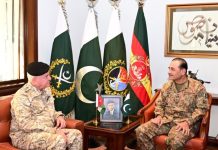BEIJING: After winning reelection and extending his two decades in power, Turkish President Recep Tayyip Erdogan met with his supporters in Ankara and called on them to build a “century of Turkey” together.
Analysts said that during his extended tenure, Erdogan may continue a balanced and pluralistic foreign policy with geopolitical ambitions, but with the contradictions in Turkey-US relations still proving difficult to resolve, Turkey may become more estranged from the US and the West.
Erdogan, the 69-year-old head of the Islamist-rooted AK Party, won re-election with 52.1 percent of the vote and challenger Kemal Kilicdaroglu had 47.9 percent, Reuters reported.
On Monday, Chinese President Xi Jinping congratulated Erdogan on his reelection as President of the Republic of Turkey, and said that China and Turkey are both major developing countries and emerging market countries, and share extensive common interests. In recent years, the China-Turkey strategic cooperative relationship has maintained a momentum of development, and practical cooperation in various fields has made positive headway.
Xi said he prizes the development of China-Turkey relations and stands ready to work with Erdogan to promote mutual understanding and mutual support on issues concerning each other’s core interests and major concerns so as to boost the sustained, sound and stable development of the two countries’ strategic cooperative relationship.
The election in Turkey, a country located at the crossroads of East and West, has drawn the world’s attention in recent months, with some Western media calling it “one of the most consequential” elections for the country. No candidate won more than 50 percent of the first round of voting on May 14. After the result came out, Erdogan’s challenger, Kilicdaroglu, called it “the most unfair election in years” but did not dispute the outcome, Reuters reported.
Erdogan’s victory extends his tenure as the longest-serving leader since Mustafa Kemal Ataturk established modern Turkey a century ago, while his long period in power has also come under criticism from the US and some Western media. Turkey entered “the era of Erdogan” at the beginning of the 21st century, and the Turkish leader’s individual style marked by the country’s domestic politics, diplomacy and major policies that he has implemented for the past two decades will be carried on after his victory, Tian Wenlin, a research fellow at the China Institutes of Contemporary International Relations, told the Global Times.
Erdogan’s 20 consecutive years in power have freed Turkey from frequent government changes and brought more stability, order and predictability to the country’s politics. Meanwhile, with the growth of its comprehensive national strength, Turkey has grown into an important geopolitical power that is more deeply involved in multiple regions and sensitive issues, and effectively achieved its strategic goals, Zan Tao, an expert on Turkish affairs and an associate professor at Peking University, told the Global Times.
In terms of social culture, Erdogan has promoted “traditional values” in Turkey, which has inspired confidence and patriotism among Turkish people on the one hand and made Turkish society increasingly conservative on the other, with more value placed on Islamic symbols and the abolition of some policies on secularization, including not wearing headscarves in public places.
The domestic economy will top Erdogan’s agenda in his new term, analysts said. The Turkish lira has devalued steadily in recent years, halving in value in one year alone, and Erdogan’s unorthodox economic policies, including a long-term aversion to raising interest rates, have been criticized by some in Turkey for contributing to rising inflation, media reported. –The Daily Mail-Global Times news exchange item




